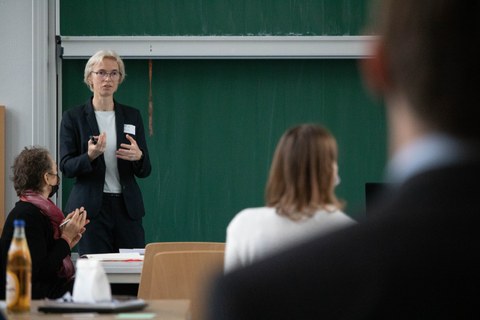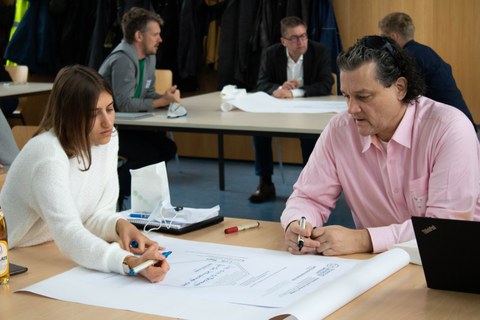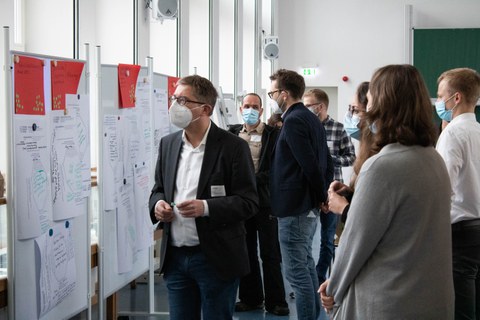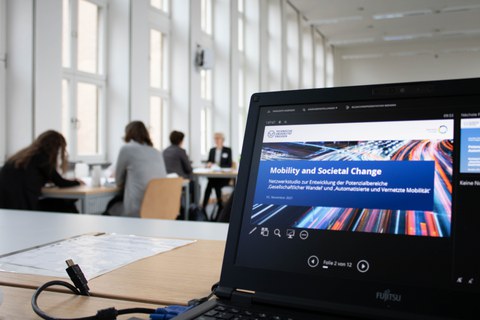Dec 06, 2021
Network studio “Mobility and Societal Change”: ExU priority topics “Automated and networked mobility” (ANM) and “Societal change” (SC) in exchange
What will the mobility of the future look like, which will not only meet the demands of the economy and everyday human life, but also the environment? What conditions does a sustainable and resilient transport infrastructure have to meet? Scientists from the two ExU priority topics “Automated and Networked Mobility” (ANM) and “Societal Change” (SC) at TU Dresden addressed these and other questions on November 5, 2021. On the occasion of the network studio “Mobility and Societal Change”, engineers, transport and humanities and social scientists met to exchange ideas and jointly draft interdisciplinary questions and develop research ideas for future mobility.
On the evening before the network studio, the guest lecture “Will digitization change everything? Between path dependencies, possible disruptions and illusions” by the mobility researcher Dr. habil. Weert Canzler. This clarified once again the problems of motorized individual transport and showed various possible solutions using examples from around the world. He emphasized the need for interdisciplinary cooperation when dealing with such a comprehensive problem.

Begrüßung durch Prof.in Regine Gerike
The network studio itself started on the morning of November 5th in compliance with the Corona rules in the drawing room of the Potthoff building, the traditional faculty building of Dresden's traffic sciences. After a brief welcome by the research officer of the priority topic ANM, Anett Ludwig, and the scientific coordinator of the potential area SC, Dr. Lucas von Ramin, Prof. Regine Gerike (ANM) and Prof. Christian Prunitsch (SC) presented their priority topics in detail and their current challenges.

Die Teilnehmer:innen in der ersten Gruppenarbeitsphase
Then the participants got to know each other in interdisciplinary and interchanging small groups. The task was to define own concepts of mobility and to develop initial ideas for common research questions. These ideas were developed by the TUD Project Scouts Dr. Sebastian Schneider and Dr.-Ing. Rico Hickmann and the co-organizer of the event and scientific coordinator of the Center for Integration Studies, Dr. Karoline Oehme-Jüngling. Eight subject clusters were identified: "Traffic of the future - visions", "Safe mobility", "Technical-social mobility / product development", "Political control / planning / governance", "Mobility narratives / -mindsets" and "Socially fair mobility", “Sustainability”, “Acceptance Research”. From these, the scientists democratically selected a maximum of five topics for further processing.

Prof. Christian Prunitsch u.a. bewerten die Projektideen
In the second group work phase, the participants were distributed among four of the selected clusters. During one hour of intensive exchange, the approaches were deepened and further discussed. At the end of the work phase, there were presentations on the subjects of “Socially Equitable Mobility”, “Transport of the Future - Visions”, “Sustainability” and “Mobility Narratives / Mindsets”.
The researchers then rated the four draft ideas with regard to their potential for further development and consolidation. All four topics were encouraged, as was the concept of the interdisciplinary network studio itself. All sides would like the cross-departmental collaboration to continue and see great potential in research groups with such diverse expertise.
The priority topics as well as the project scouts are measures of the excellence strategy of the TU Dresden. The network studio was funded by the Federal Ministry of Education and Research (BMBF) and the Free State of Saxony as part of the excellence strategy of the federal and state governments.

